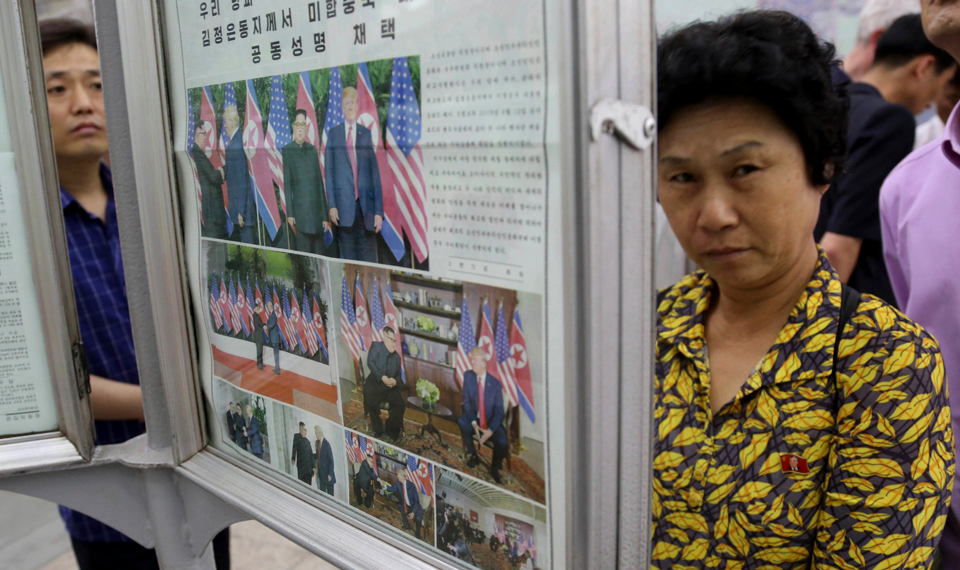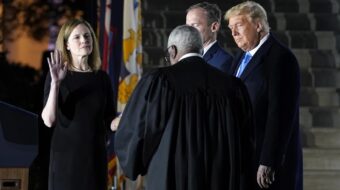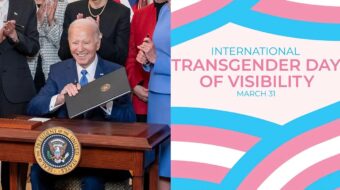
Some critics have knocked President Trump for making “too many concessions” to North Korean leader Kim Jong-un at the historic Singapore Summit—the first-ever meeting between a U.S. president and North Korean leader.
Trump’s foreign policy instincts have had me white-knuckled for the past year and a half. But against a backdrop of possible nuclear war, it would be overly cynical not to recognize the meeting’s potential for good.
At best, the meeting set the stage for North Korea’s denuclearization—and possibly even an end to the nearly 70-year-old, stalemated Korean War. If you’re against war, this is a good development.
Summit Coverage in People’s World
– Despite Trump’s record, there are positives from the Korea summit
– What counts as “success” at the Trump-Kim summit?
– Sabotaging the summit: Trump administration sinks N. Korea meeting
Just six months ago, reasonable people had reasonable fears of the world’s first two-sided nuclear war, as President Trump and North Korean leader Kim Jong Un traded middle-school insults and flaunted their nuclear arsenals.
There are still countless ways the negotiations could go wrong, and real reasons to fear that hardline members of the administration—and its opposition, too—would allow that to happen. But diplomacy offers chances for bigger gains, and smaller losses, than war.
Unfortunately, the U.S. spends more than 20 times more on war and militarism than we do on diplomacy each year.
Our choices have been stark.
The U.S. chose war in Iraq over diplomacy in 2003. Our leaders chose certain risk over likely rewards by pulling out of the Iran nuclear deal. And they chose a lone plunge backward over a carefully planned march forward when they stepped back from the Paris climate accord before that.
This must not happen when it comes to the North Korea negotiations.
The costs of war are horrifying. The current wars in Iraq and Afghanistan have cost the U.S. $5.6 trillion, and 6,800 U.S. soldiers have lost their lives. That doesn’t include non-fatal casualties, or the human and economic costs of PTSD and family stress that echo far beyond the battlefield.
And it doesn’t count the hundreds of thousands of innocent civilians who have been needlessly killed throughout our warzones. A full-scale war with North Korea would likely be many times worse.
The North Korea negotiations are far from over, and could still tip from a fragile diplomacy back to middle-school insults and perhaps even to war. But we can and should be more optimistic than that. Diplomacy isn’t just the better way. It’s the only way.
For the Korean talks to work, this administration will have to value diplomacy more than it did in its narrow-minded rejection of the Iran deal. It will have to value diplomacy more than it did when it pulled out of the Paris climate agreement.
There’s so much to gain from open communication and keeping our word. And there’s so much more to lose if we allow things to fall apart.
OtherWords
Like free stuff? So do we. Here at People’s World, we believe strongly in the mission of keeping the labor and democratic movements informed so they are prepared for the struggle. But we need your help. While our content is free for readers (something we are proud of) it takes money — a lot of it — to produce and cover the stories you see in our pages. Only you, our readers and supporters, can keep us going. Only you can make sure we keep the news that matters free of paywalls and advertisements. If you enjoy reading People’s World and the stories we bring you, support our work by becoming a $5 monthly sustainer today.

MOST POPULAR TODAY


Zionist organizations leading campaign to stop ceasefire resolutions in D.C. area

High Court essentially bans demonstrations, freedom of assembly in Deep South

Afghanistan’s socialist years: The promising future killed off by U.S. imperialism

Communist Karol Cariola elected president of Chile’s legislature






Comments